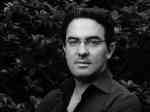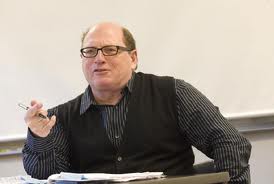September is here. Here’s a look at the latest books and news in Latino lit:
 • Already out: In A Crack in the Wall by Claudia Piñeiro, a young woman asks about the whereabouts for a missing person. Piñeiro talked to Publishers Weekly, who called her “Argentina’s top crime writer.”
• Already out: In A Crack in the Wall by Claudia Piñeiro, a young woman asks about the whereabouts for a missing person. Piñeiro talked to Publishers Weekly, who called her “Argentina’s top crime writer.”
• A penguin starts school in the children’s book Tony Baloney School Rules by Pam Muñoz Ryan.
 • Sept. 3 – Latino Americans: The 500-Year Legacy That Shaped a Nation by Ray Suarez is the companion book to the PBS series that will air this month.
• Sept. 3 – Latino Americans: The 500-Year Legacy That Shaped a Nation by Ray Suarez is the companion book to the PBS series that will air this month.
• Sept. 15: In Monica Brown’s children’s book, Marisol Mcdonald and the Clash Bash/Marisol Mcdonald Y La Fiesta Sin Igual, the sequel to the award-winning Marisol McDonald Doesn’t Match / Marisol McDonald no combina, the 8-year-old Peruvian-Scottish-American title character throws a birthday party.
 • Sept 17: Musician Linda Ronstadt writes about her life in Simple Dreams: A Musical Memoir. She talked to The New York Times about the book and her recent diagnosis of Parkinson’s Disease, which has prevented her from singing.
• Sept 17: Musician Linda Ronstadt writes about her life in Simple Dreams: A Musical Memoir. She talked to The New York Times about the book and her recent diagnosis of Parkinson’s Disease, which has prevented her from singing.
• Sept. 24: The family of baseball great Roberto Clemente remember him in Clemente: The True Legacy of an Undying Hero.
• Sergio de la Pava won the PEN/Robert W. Bingham Prize for debut writers for his novel, A Naked Singularity. Publishers Weekly profiled the author who is a public defender, like the character in his book, and self-published the book.
• Sept. 21-22: The National Book Festival in Washington, D.C. will include Marie Arana, Monica Brown, Alfredo Corchado, Cristina García (right), Gilbert Hernandez, Jaime Hernandez and Linda Ronstadt.
• Sept. 22: The Brooklyn Book Festival will feature Cristina García, Manuel Gonzales, Tim Z. Hernandez, Patricio Pron, Linda Rodriguez, Justin Torres and Juan Gabriel Vásquez.
• Oct. 5: Reyna Grande (left) will be the keynote speaker at the Comadres and Compadres Writers Conference in Brooklyn, N.Y. The event will include panelists , such as Raquel Cepeda and Carlos Andrés Gómez, and one-on-one sessions with agents and editors.
Other features:
 • The Texas Observer had a great article about three Latina poet laureates – Gwendolyn Zepeda of Houston, Olga Valle-Herr of McAllen and Carmen Tafolla (right) of San Antonio. The state of Arizona named Alberto Álvaro Ríos as its first Poet Laureate. NBC Latino profiled Ríos.
• The Texas Observer had a great article about three Latina poet laureates – Gwendolyn Zepeda of Houston, Olga Valle-Herr of McAllen and Carmen Tafolla (right) of San Antonio. The state of Arizona named Alberto Álvaro Ríos as its first Poet Laureate. NBC Latino profiled Ríos.
 • Junot Díaz (left) revealed his writing process to The Daily Beast. He also was profiled in Playboy, an article that received this response from The Atlantic Wire, which compared him to Hugh Hefner but “with less hair and more imagination.” This Is How You Lose Her will come out in paperback Sept. 3, with a deluxe edition featuring illustrations by Jaime Hernandez Oct. 31.
• Junot Díaz (left) revealed his writing process to The Daily Beast. He also was profiled in Playboy, an article that received this response from The Atlantic Wire, which compared him to Hugh Hefner but “with less hair and more imagination.” This Is How You Lose Her will come out in paperback Sept. 3, with a deluxe edition featuring illustrations by Jaime Hernandez Oct. 31.
 • Juan Gabriel Vásquez (right), author of The Sound of Things Falling, picked his favorite Latino literature picks for The Daily Beast. He also talked to NPR about his book. The Atlantic Wire featured him in an article about contemporary Latin American literature.
• Juan Gabriel Vásquez (right), author of The Sound of Things Falling, picked his favorite Latino literature picks for The Daily Beast. He also talked to NPR about his book. The Atlantic Wire featured him in an article about contemporary Latin American literature.
 • Mario Alberto Zambrano (left) talked about the inspiration of his book Lotería to Kirkus Reviews. Zambrano also appeared on “The Diane Rehm Show” on NPR.
• Mario Alberto Zambrano (left) talked about the inspiration of his book Lotería to Kirkus Reviews. Zambrano also appeared on “The Diane Rehm Show” on NPR.
• Fans of Jorge Luis Borges can listen to him discuss his books thanks to some audio recordings he left behind, reports Héctor Tobar of The Los Angeles Times.
• PBS profiled Rueben Martinez, who turned his San Diego barbershop into a bookstore.
• NBC Latino talked to David Tomas Martinez about his transformation from gang member to poet.



















